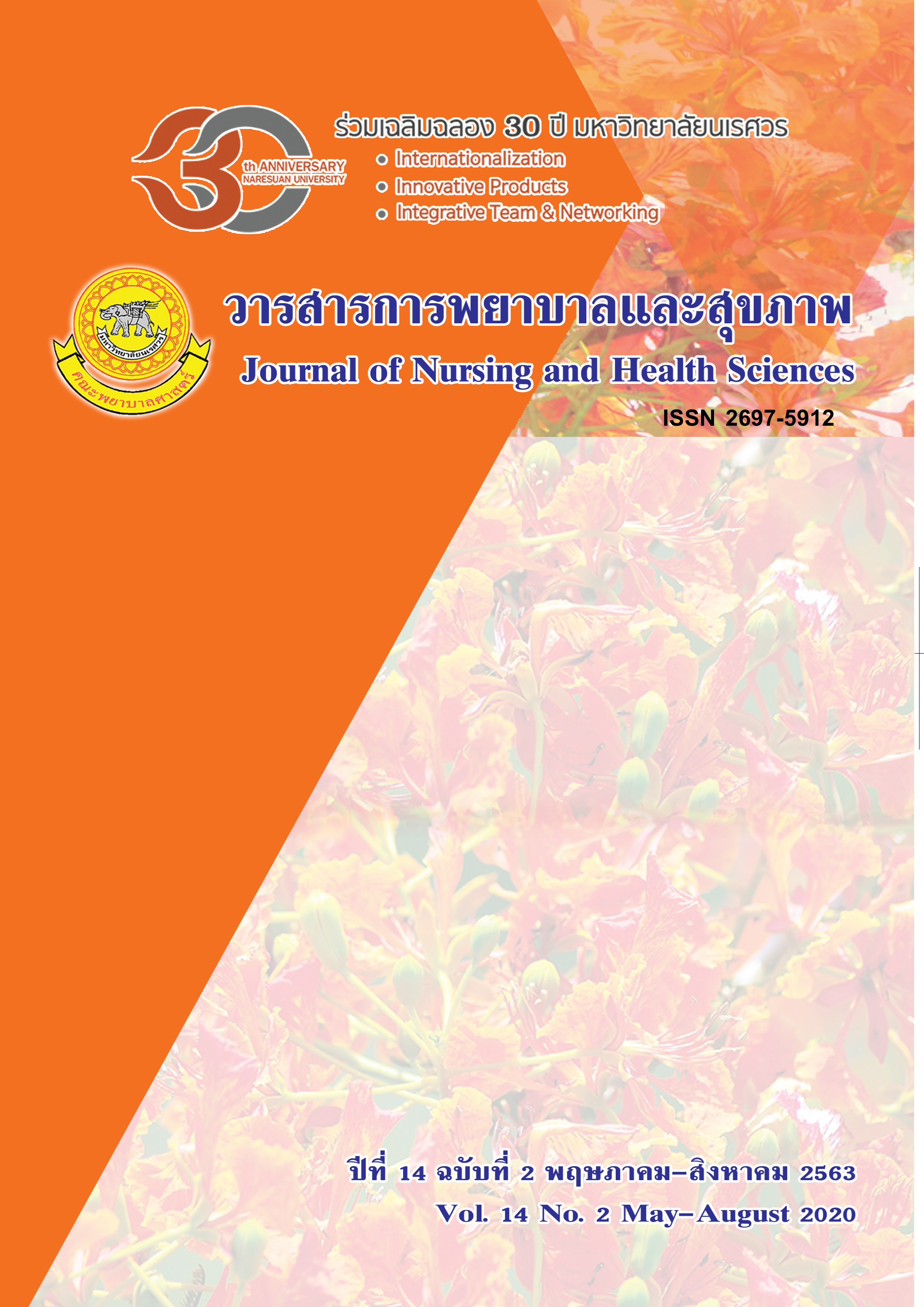ผลของโปรแกรมการส่งเสริมการรับรู้สมรรถนะตนเองต่อการรับรู้สมรรถนะตนเองและ ความสำเร็จในการหย่าเครื่องช่วยหายใจของผู้ป่วยผ่าตัด
Main Article Content
บทคัดย่อ
การวิจัยนี้เป็นการวิจัยกึ่งทดลอง แบบสองกลุ่มวัดก่อนและหลังการทดลอง มีเป้าหมายเพื่อศึกษาผลของ โปรแกรมส่งเสริมการรับรู้สมรรถนะตนเองต่อการรับรู้สมรรถนะตนเองและความสำเร็จในการหย่าเครื่องช่วยหายใจ ของผู้ป่วยผ่าตัด กลุ่มตัวอย่างคือผู้ป่วยที่ได้รับการวางแผนให้ใช้เครื่องช่วยหายใจในระหว่างการผ่าตัด และหลังผ่าตัด ที่เข้ารับการรักษาในหอผู้ป่วยวิกฤติศัลยกรรม คัดเลือกกลุ่มตัวอย่างมีลักษณะใกล้เคียงกันด้วยการจับคู่ จำนวน 20 ราย โดยจัดให้ 10 รายแรก อยู่ในกลุ่มควบคุม และ 10 รายหลัง เป็นกลุ่มทดลอง เครื่องมือที่ใช้ในการวิจัยคือ เครื่องมือที่ใช้ในการวิจัยประกอบด้วย 1) เครื่องมือที่ใช้ในการเก็บรวบรวมข้อมูล ได้แก่ แบบสอบถามข้อมูลทั่วไป และข้อมูลสุขภาพ แบบวัดการรับรู้สมรรถนะตนเองในการหย่าเครื่องช่วยหายใจ แนวทางในการหย่าเครื่องช่วยหายใจ ของโรงพยาบาลมหาวิทยาลัยนเรศวร ประกอบด้วยการดูแลผู้ป่วยและแบบประเมินความสำเร็จในการหย่า เครื่องช่วยหายใจของผู้ป่วยหลังผ่าตัด 2) เครื่องมือที่ใช้ในการทดลอง ได้แก่ โปรแกรมการส่งเสริมการรับรู้สมรรถนะ ตนเองของผู้ป่วยผ่าตัด ประกอบด้วย คู่มือการปฏิบัติตัวในการหย่าเครื่องช่วยหายใจสำหรับผู้ป่วยผ่าตัด วิดีทัศน์ "ฝากถึง...เพื่อน" วิเคราะห์ข้อมูลโดยใช้ ความถี่ ร้อยละ ค่าเฉลี่ย ส่วนเบี่ยงเบนมาตรฐาน Wilcoxon signed ranks test และ Mann-Whitney test ผลการวิจัยพบว่า1. ผู้ป่วยผ่าตัดที่ได้รับการใช้เครื่องช่วยหายใจหลังได้รับโปรแกรมส่งเสริมการรับรู้สมรรถนะตนเอง มีระดับการรับรู้สมรรถนะตนเองมากกว่าก่อนได้รับโปรแกรม อย่างมีนัยสำคัญ (p = 0.01) 2. ผู้ป่วยผ่าตัดที่ได้รับการใช้เครื่องช่วยหายใจที่ได้รับโปรแกรมส่งเสริมการรับรู้สมรรถนะตนเอง มีระดับ การรับรู้สมรรถนะตนเองมากกว่ากลุ่มที่ได้รับการพยาบาลตามปกติ อย่างมีนัยสำคัญ (p = 0.001) 3. ผู้ป่วยผ่าตัดที่ได้รับการใช้เครื่องช่วยหายใจที่ได้รับโปรแกรมส่งเสริมการรับรู้สมรรถนะตนเอง และกลุ่ม ที่ได้รับการพยาบาลตามปกติ มีความสำเร็จในการหย่าเครื่องช่วยหายใจไม่แตกต่างกัน แต่พบว่าผู้ป่วยที่ได้รับ โปรแกรม มีความพร้อมในการหย่าเครื่องช่วยหายใจดีกว่า และสามารถใช้เครื่องบริหารปอดได้มีประสิทธิภาพ มากกว่ากลุ่มที่ได้รับการพยาบาลตามปกติ
Article Details
เอกสารอ้างอิง
Bandura, A. (1997). Self -efficacy: The exercise of control. United states of America: Freeman and company.
Boles, J. M., Bion, J., Connors, A., Herridge, M., Marsh, B., Melot, C., … Welte, T. (2007). Weaning from mechanical ventilation. European Respiratory Journal, 29(5), 1033-1056.
Burns, S. M., Fisher, C., Earven T. S. S., Lewis, R., Merrel, P., Conaway, M. R., & bleck, T.P. (2010). Multifactor clinical score and outcome of mechanical ventilation weaning trials: Burns wean assessment program. American Journal of Critical Care, 19(5), 431-439.
Chamraksa, P., & Srimad, T. (2014). Factors predicting weaning time in surgical respiratory care unit. Princess of Naradhiwas Unniversity Joural, 6(2), 36-46. [In Thai].
Chartramthitikun, P. (2012). The effects of perceived self-efficacy promoting program on postoperative performance among patients undergoing open surgery for renal calculi. Master Thesis (Nusing), Khon kaen University, Khon kaen. [In Thai].
Chobarunsitti, S., Kasemkitwattana, S., & Chanruangvanich, W. (2008). Effects of self-efficacy enhancement on patients post abdominalSurgery recovery at Phaphuttabath Hospital, Saraburi. Thai Journal of Nursing Council, 23(1), 100-114. [In Thai].
Esteban, A., Anzueto, A., Frutos, F., Alía, I., Brochard, L., Stewart, T. E., … Tobin, M. J. (2002). Characteristics and outcomes in adult patients receiving mechanical ventilation: A 28-day international study. The Journal of the American Medical Association, 287(3), 345-355.
Funk, G. C., Anders, S., Breyer, M. K., Burghber, O. C., Edelmann, G., Heindl, W., … Hartl, S. (2010). Incidence and outcome of weaning from mechanical ventilation according to new categories. European Respiratory Journal, 35: 88-94.
Heffelfinger, S., Calamari, J. E., Workman, D. E., Lawn, G., & Kelly, J. (2006). Anxiety sensitivity and ventilator weaning: A preliminary analysis. Anxiety Stress and Coping, 19(3), 211-226.
Kalanuria, A. A., Zai, W., & Mirski, M. (2014). Ventilator-associated pneumonia in the ICU. Critical Care, 18(2), 208.
Karakurt, Z., Funfulla, F., Ceriana, P., Carlucci, A., Grassi, M., Colombo, R., … Nava, S. (2012). Physiologic determinants of prolonged mechanical ventilati on in patients after major surgery. Journal of Critical Care, 27(2), 9-16.
Klinmai, S. (2011). The Effect of promoting self-efficacy and outcome expectancy in qigong exercise program on functional acpacity in heart failure patients. Master Thesis (Nursing), Chulalongkorn University, Bangkok. [In Thai].
Ledoux, D., & Luikart, H. (2005). Cardiac surgery. In S. L. Wood, E. S. S. Froelicher, S. U. Motzer & E. J. Bridges (Eds.), Cardiac nursing (pp. 628-658). Philadelphia: Lippincott Williams & Wilkins.
Lemone, P., Burke, K., & Bauldoff, G. (2011). Medical surgical nursing: Critical thinking in patient care (5th ed.). Upper Saddle River, N.J. : Pearson.
Mongkolsawat, S. (2010). The effect of edcational program for patients with colostomy in Khon Kaen Hospital. Master Thesis (Nusing), Khon kaen University, Khon kaen. [In Thai].
Pathomjaruwat, T., Wattanakitkrileart, D., Pinyopasakul, W., & Wongsurakiat, P. (2013). Correlation between awareness of self performance of disorder severity and of anxiety and duration of spontaneous breathing trial in patients not having been weaned off respirators. Thai Journal of Nursing Council, 28(1), 49-63. [In Thai].
Perren, A., Previsdomini, M., Llamas, M., Cerutti, B., Györik, S., Merlani, G., & Juliet, P. (2010). Patients' prediction of extubation success. Intensive Care Medicine, 36(12), 2045-2052.
Phomjumpa, S. (2008). Effects of a perceived self-efficacy promoting program on breastfeeding behavior among adolescent mothers. Master Thesis (Nusing), Thammasat University, Bangkok. [In Thai].
Safdar, N., Dezfulian, C., Collard, H. R., & Saint, S. (2005). Clinical and economic consequences of ventilator associated pneumonia: A systematic review. Critical Care Medicine, 33(10), 2184-2193.
Sanee, N. (2011). Effect of perceived self-efficacy promoting program on rehabilitation behavior in patients with femoral fracture receiving internal fixation. Master Thesis (Nursing), Chulalongkorn University, Bangkok. [In Thai].
Suaroon, P., Thosingha, O., Danaidusadeekul, S., & Chaiwat, O. (2015). Risk factors in prolonged use of mechanical ventilators in post-operative abdominal surgery patients. Thai Journal of Nursing Council, 30(4), 107-120. [In Thai].
Twibell, R., Siela, D., & Mahmoodi, M. (2003). Subjective perceptions and physiological variables during weaning from mechanical ventilation. American Journal of Critical Care, 12(2), 101-112.
Watanakijkrilert, D., Pathomjaruvat, T., & Kedcham, D. (2013) Factors predicting weaning success in patients with respiratory failure receiving invasive mechanical ventilator. Nursing Science Journal of Thailand, 31(3), 57-66. [In Thai].


